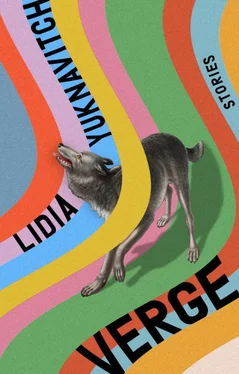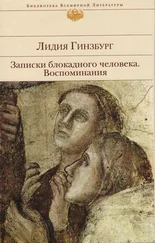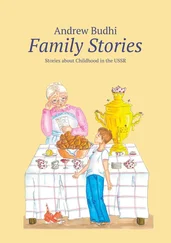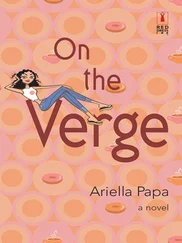Лидия Юкнавич - Verge - Stories
Здесь есть возможность читать онлайн «Лидия Юкнавич - Verge - Stories» весь текст электронной книги совершенно бесплатно (целиком полную версию без сокращений). В некоторых случаях можно слушать аудио, скачать через торрент в формате fb2 и присутствует краткое содержание. Город: New York, Год выпуска: 2020, ISBN: 2020, Издательство: Riverhead Books, Жанр: Современная проза, на английском языке. Описание произведения, (предисловие) а так же отзывы посетителей доступны на портале библиотеки ЛибКат.
- Название:Verge: Stories
- Автор:
- Издательство:Riverhead Books
- Жанр:
- Год:2020
- Город:New York
- ISBN:978-0-52553-487-7
- Рейтинг книги:4 / 5. Голосов: 1
-
Избранное:Добавить в избранное
- Отзывы:
-
Ваша оценка:
- 80
- 1
- 2
- 3
- 4
- 5
Verge: Stories: краткое содержание, описание и аннотация
Предлагаем к чтению аннотацию, описание, краткое содержание или предисловие (зависит от того, что написал сам автор книги «Verge: Stories»). Если вы не нашли необходимую информацию о книге — напишите в комментариях, мы постараемся отыскать её.
A fiercely empathetic group portrait of the marginalized and outcast in moments of crisis, from one of the most galvanizing voices in American fiction. cite
Verge: Stories — читать онлайн бесплатно полную книгу (весь текст) целиком
Ниже представлен текст книги, разбитый по страницам. Система сохранения места последней прочитанной страницы, позволяет с удобством читать онлайн бесплатно книгу «Verge: Stories», без необходимости каждый раз заново искать на чём Вы остановились. Поставьте закладку, и сможете в любой момент перейти на страницу, на которой закончили чтение.
Интервал:
Закладка:
Anastasia believed in the secrets of girls. Maybe all girls carried them.
After that, Jane Goodall went to Africa to study chimp behavior.
Anastasia grew the beginnings of breasts.
Kiril approached sixteen years old, the age when the children were no longer children enough to stay in the house.
The week before Kiril was to leave, he caught Anastasia in an alley on her way home from selling hair. He grabbed her by the neck and held her against the wall like that. With his free hand, he unzipped his pants, grabbed her feeble hand, and said, “Do it. Massage my organ.” His mouth looked like a line cut with a knife.
For a while she didn’t move. Briefly she wondered if it was possible to rip a cock off a body with one’s bare hands. She’d once heard of a father ripping his daughter’s ear off. Then he tightened his grip around her neck and lifted her a little off the ground, to show her that he could. Her windpipe constricted. This is a stupid way to die, she thought. Silently, in her head, she repeated the names of the monkeys: Abrek, Bion, Verny and Gordy, Dryoma and Yerosha, Zhakonya and Zabiyaka, Krosh and Ivasha, Lapik and Multik. Then he put her back down on the ground and squeezed her neck until, with her unfeeling hand, she obeyed. Her eyes watered, but she stared at him, refusing to release his gaze. In the end, he was the one to look away. Then he came. Then he ran. Anastasia spit on the ground next to the semen. She looked at her hand, then wiped it on the wall, carrying a small murderous desire up her arms and into the base of her skull.
BY THE TIME Anastasia turned eighteen, she had her own crew of four girl children. The aunt, or whoever she was, had agreed to something like a franchise situation. Anastasia earned enough to rent a small apartment for them to share. They all slept in the main room together. Goodall had a position on the mantel above the fireplace.
At night, in front of the fire, Anastasia would read to the girls from Jane Goodall’s book. She read to them about how the orphaned chimps who make it to sanctuaries are lucky. About how some infant chimps are sold to animal dealers, smuggled to different countries in boxes that are too small and purposely mislabeled, often dying along the way. About how some chimps are bought to be used in zoos, or as pets for wealthy people, or are beaten with metal bars as part of their circus training. When Anastasia came to the part about medical research labs, where chimps are forced to live in tiny cages and undergo medical experiments, she’d read very slowly what Jane Goodall wrote about how chimps feel pain and fear and experience depression and most other human emotions. Now and then, as she read, one of the children would look up over the fireplace at Goodall.
Anastasia would end the stories by reminding the girls that the United States of America had retired nearly four hundred medical research chimps, many of them returned to live safely in sanctuaries. The United States, a place they all hoped to reach someday.
One afternoon Anastasia was called on a special mission that required herself and one other girl. The organ donation was a kidney—that was not so unusual—but the donor would also be donating a piece of liver for a different patient, and thus a second organ runner would be needed, to be sent off in another direction. In addition, the donor would need some kind of special care for twenty-four hours—just observation, they promised—but a kind of body sitter for a night and a day. The price was unusually good. The recipient, who was from Miami, Florida, had asked for Anastasia specifically.
When she arrived, Anastasia knew that something was not quite right. She could feel it in her neck and spine. The building had no other inhabitants; the stairwell lights were burned out, and the wooden walls smelled moldy and putrid. A voice at the stop of the stairs said, “Come.” Anastasia paused, but she knew the money was enough to get the two of them more than a refrigerator or stove. It might get them out forever. With her strong hand, she took the other girl’s arm. With her feeble hand, she fingered a knife strapped to the outside of her leg, underneath her dress.
At the door at the top of the stairs, a woman ushered them into the main room of a dark and rotting apartment and then into a bedroom. In the bedroom were a bed, a dim-bulbed lamp, a man standing there with surgical gloves and a tray of operating items, the organ recipient on the bed prepped and sedated, and a cage of the size one might need for a wild animal.
Inside the cage was Kiril.
Anastasia did not blink. She let go of the girl and said, “Where is the donor?”
“There,” said the man who would perform the surgery, pointing to the cage. The woman said something in Ukrainian, some kind of warning.
Anastasia stepped closer to the cage. It did not take long for her to see that Kiril had been beaten. Badly. One of his eyes was swollen shut. He held one arm bent against his body like a broken wing. His mouth was bleeding. When he looked up, she could not tell if he recognized her. He made a sound like an animal in danger or a person whose wits had left him. Not a bellow, not a whimper, but something in between.
What she knew was that Kiril had only one kidney.
What she knew was that removing the other would kill him.
Kiril had been captured, it was clear. In this room, his worth was less than nothing. Whatever money—that thing more valuable than a body, or a people, or a nation—had changed hands was worth more than the life of one homeless creature in this newsless, powerless, invisible country.
She looked at her own hand. The feeble one. The one they expected her to use to preserve a human organ before it was sewn into a foreign body from some other world.
She reached out to Kiril in the cage. He put his face against the metal. She touched his skin with the back of her feeble hand. He whimpered.
Kiril would die, but not by her hand.
Or he would die by all of our hands.
When Jane Goodall saw Louis Leakey discover his first ape skull during an archaeological dig, she thought about how that ape had stood right where they were standing, had felt the air on its skin and the sun and the good dirt—how the ape had inhabited the same world in the same spot, as if time and evolution were nothing. It existed, and then it did not.
Anastasia thought of all the girls in the world who make transactions toward life away from death, buying time, buying hope, buying a chance or a way out. She thought about all the boys with the power to stop them with a hand to the throat, or with a dollar or a whispered word. She thought about Jane Goodall, and Africa, and how some monkeys were released into sanctuaries and others were beaten and tortured and others were shot into space. She thought about the United States, those weird and deformed so-called states stitched together from a brutal and bloody beginning, still straining against their sutures, like a hand sewn too close to a foot. How do any of us evolve, she wondered, from out of all this?
“I’m ready,” she said.
STREET WALKER
First thing in the morning, when I take out the trash, I see it: syringe on the lawn. Still bloody. It spikes and chills my memory: four long years of youth sliding cold silver glint into waiting blue.
My neighborhood is turning. It’s not dramatic, it’s no more or less real than TV, than other places I have lived, all those little white-lined streets. We can posture as a nation of shock all we want. It’s still a story we know: Somebody wants something more than their own life. Somebody else is terrified by all that they want.
It’s not possible, in my neighborhood, to tell who has money enough to live on and who does not, though it’s clear that no one is wealthy. Old two- and three-story homes built in the early 1900s, with questionable roofs and overstuffed leaf gutters. Ours a sort of bohemian-looking hippie haven, both inside and out: overgrown garden, cracked eaves, front porch step rotting away. The rest of our street dotted with flat ramblers, faux-stone façades, additions tacked onto additions like berserk extra appendages. One of the houses has been graced with a concrete lion. So regal! Covered in moss and bird shit.
Читать дальшеИнтервал:
Закладка:
Похожие книги на «Verge: Stories»
Представляем Вашему вниманию похожие книги на «Verge: Stories» списком для выбора. Мы отобрали схожую по названию и смыслу литературу в надежде предоставить читателям больше вариантов отыскать новые, интересные, ещё непрочитанные произведения.
Обсуждение, отзывы о книге «Verge: Stories» и просто собственные мнения читателей. Оставьте ваши комментарии, напишите, что Вы думаете о произведении, его смысле или главных героях. Укажите что конкретно понравилось, а что нет, и почему Вы так считаете.












